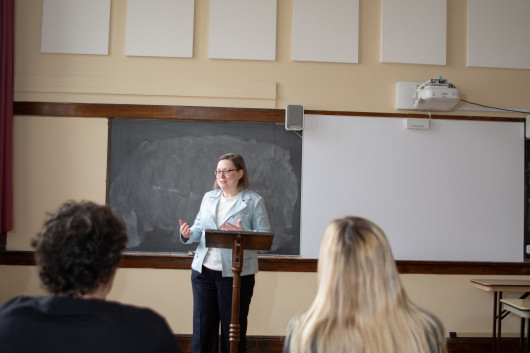Each year, the In Trust Center provides Resource Grants to support schools with matching funds for special projects. This story is part of a series highlighting initiatives made possible through these grants. Learn more about the Resource Grants program here.
 A large banner advertising the services of the newly established Knox Counselling Centre hangs in the 180-year-old foyer of Knox College, a graduate school of theological education at the University of Toronto. The banner has done its job.
A large banner advertising the services of the newly established Knox Counselling Centre hangs in the 180-year-old foyer of Knox College, a graduate school of theological education at the University of Toronto. The banner has done its job.
“When we ask our clients how they found us, most of them say the banner or posters,” says Dr. Mi-Weon Yang, center director. “Our physical location at the heart of the University of Toronto helped us. Our success – 400 appointments completed in seven months – has been bittersweet.”
The center offers in-person and virtual counseling and serves as a practicum site for Knox students learning to provide spiritually integrated psychotherapy.
“There are huge demands for mental health help here. We are proactively offering this service across the university. Now we have a waiting list,” says Yang.
When students and other clients – the service is open to anyone – enter Knox to do in-person counseling, they head to a carefully and thoughtfully furnished space in the seminary’s basement. The rooms, historically used for casual meetings of graduate students, needed some sprucing up.
Yang’s team maximized an In Trust Resource Grant by running a matching donation campaign to pay for the signage that brings so many clients in, along with furnishings like a sofa, comfortable chairs, side tables, a rug, throw blankets and cushions to bring warmth and welcome into an in-person counseling experience that can initially feel intimidating.
“It was a good space, but it looked ugly,” says Yang. “It was a basement. It was completely made over without touching any of the structure. It was a small budget, but we made it work. Clients really love it. The space invites them to feel welcome and embraced.”
“The grant has enabled Knox College to establish an on-site and virtual counseling center where our students can be supervised in the application of spiritually integrated psychotherapy. The new Knox Counselling Centre will enable us to conduct research into the assessment of skill development in this important model of therapy.” Dr. Mi Weon Yang.
When the Knox students – who are working to complete 125 clinical hours over seven to eight months – are offering therapy online, they do so in a space protected by new soundproof panels, also purchased with funds raised through the matching campaign. Confidentiality is protected in the new space.
A typical day might see students in classes in the morning, followed by practicing virtual counseling in the afternoon.
“Right after class, they can come to these 100 percent sound-proof spaces. It is quite fantastic,” says Yang.
Knox Counselling Centre has a waiting list. Yang explains that 20 percent of the clients the student team has seen are from the public.
“Our target demographic is those who can’t afford to pay traditional counseling fees,” she says.
The sliding scale of services starts with free for students and low-income clients, with some clients paying only $20.
Psychospiritual therapy is special, says Yang, because even if clients don’t believe in God or profess faith, they are still spiritual beings.
“We are inviting people to think about human presence, existence, the way of life, and the way they relate to things like God, time and relationships – including their relationship to nature, to others, and within their community,” she says. “Spirituality is how we relate ourselves to other people and spaces. We are assisting people. We are helping to support them to find meaning when they are going through some pain and suffering or loss and confusion.”
The counseling center is poised to grow, with plans for research into topics like why international students are especially seeking counseling.
“Most of our clients are international students,” says Yang. “Many are people of color, and quite young. There are lots of issues that are spiritual and have to do with maladaptation to a really different culture.”
She also plans on leading counseling students in offering group therapy to women with ADHD.
“We are assisting people. The In Trust Center grant helped us create a new and welcoming environment. Now we will grow.”